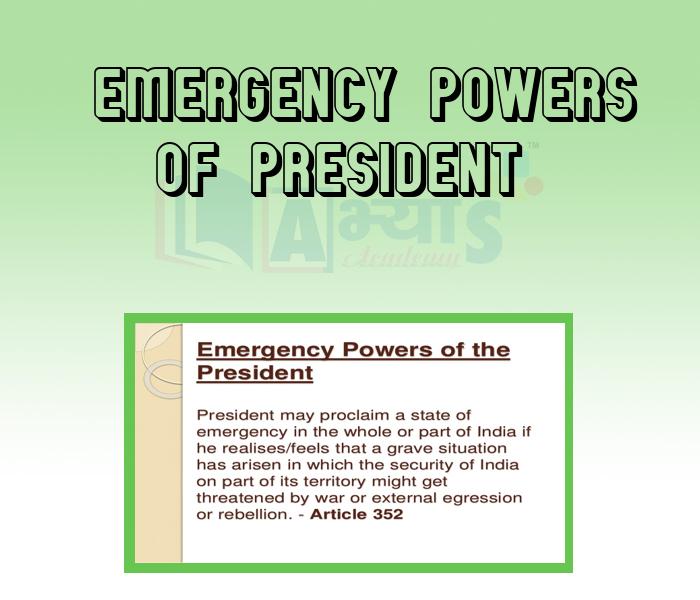Emergency Powers of President










Emergency Powers of President
Emergency Powers Of The President:
The President can declare three types of emergencies: national, state and financial. When Ambedkar was asked what the emergency meant he said that such a situation which demands immediate action is an emergency.
(1) National Emergency
(2) Failure of Constitutional Machinery in a State (State emergency)
(3) Financial Emergency
1. National Emergency:
National emergency is caused by war, external aggression or armed rebellion in the whole of India or a part of its territory. Such an emergency was declared in India in 1962 (Indo-China war), 1971 (Indo-Pakistan war), 1975 to 1977 (declared by Indira Gandhi on account of "internal disturbance"). Under Article 352 of the India Constitution, the President can declare such an emergency only on the basis of a written request by the Council of Ministers headed by the Prime Minister. Such a proclamation must be approved by the Parliament within one month. Such an emergency can be imposed for six months. It can be extended by six months by repeated parliamentary approval, up to a maximum of 3 years. The term of the Lok Sabha can be extended by a period of up to one year, but not so as to extend the term of Parliament beyond six months after the end of the declared emergency.
Which of the following are correct : (a) Under Article 352, an emergency may be declared for the whole country or for any or some part of the country. (b) During such an emergency, the President can take over the entire work of the executive. (c) There is no Financial Emergency implemented in India yet. | |||
| Right Option : D | |||
| View Explanation | |||
How much time period must be approved by the parliament for the declaration of emergency ? | |||
| Right Option : B | |||
| View Explanation | |||
In which of the following article, is it mentioned " Constitutional machinery has failed " ? | |||
| Right Option : B | |||
| View Explanation | |||
Students / Parents Reviews [10]
Being a parent, I saw my daughter improvement in her studies by seeing a good result in all day to day compititive exam TMO, NSO, IEO etc and as well as studies. I have got a fruitful result from my daughter.

Prisha Gupta
8thAbhyas Methodology is very good. It is based on according to student and each child manages accordingly to its properly. Methodology has improved the abilities of students to shine them in future.

Manish Kumar
10thMy experience with Abhyas is very good. I have learnt many things here like vedic maths and reasoning also. Teachers here first take our doubts and then there are assignments to verify our weak points.

Shivam Rana
7thIt was a good experience with Abhyas Academy. I even faced problems in starting but slowly and steadily overcomed. Especially reasoning classes helped me a lot.

Cheshta
10thIt has a great methodology. Students here can get analysis to their test quickly.We can learn easily through PPTs and the testing methods are good. We know that where we have to practice

Barkha Arora
10thAbhyas is a complete education Institute. Here extreme care is taken by teacher with the help of regular exam. Extra classes also conducted by the institute, if the student is weak.

Om Umang
10thI have spent a wonderful time in Abhyas academy. It has made my reasoning more apt, English more stronger and Maths an interesting subject for me. It has given me a habbit of self studying

Yatharthi Sharma
10thIt was good as the experience because as we had come here we had been improved in a such envirnment created here.Extra is taught which is beneficial for future.

Eshan Arora
8thMy experience with Abhyas academy is very good. I did not think that my every subject coming here will be so strong. The main thing is that the online tests had made me learn here more things.

Hiya Gupta
8thAbout Abhyas metholodology the teachers are very nice and hardworking toward students.The Centre Head Mrs Anu Sethi is also a brilliant teacher.Abhyas has taught me how to overcome problems and has always taken my doubts and suppoeted me.
